Target Audience
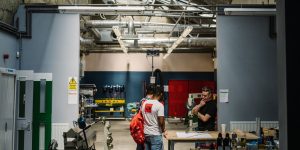
UrbanM
STEAMHouse, Birmingham City University (UK)
Urban M is an Interreg Europe project led by Birmingham City University, its aim is to support nine European Cities to develop their city and regional innovation policies to help local makerspaces thrive.
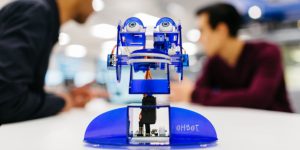
The STEAMhouse Approach
STEAMhouse, Birmingham City University (UK)
STEAMhouse is a centre for innovation, creative thinking, prototyping and business development. STEAMhouse supports entrepreneurs, sole traders, companies and citizens to build their businesses, develop products and services and bring new ideas to life. The centre supports both city and business challenges and takes an interdisciplinary approach to these issues. STEAMhouse is a partnership between Birmingham City University and Eastside Projects and funded by the European Regional Development Fund., It aims to drive innovation and research for major long-term growth across the region.
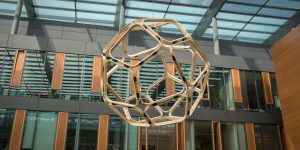
BenDit
Technische Universität Dresden (DE)
BenDit is a structure from bent wood, created at the TU Dresden as a demonstrator within the European Interreg project Adhesive Free Timber Buildings (AFTB). It has a diameter of about 3 meters and is designed to hang in the atrium of the Biology building. BenDit is a model of the deltoidal icositetrahedron. 24 identical kite-like wooden frames are connected along the edges.
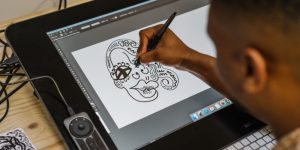
STEAM INC
Ars Electronica (AT), Science Gallery at Trinity College Dublin (IE), Birmingham City University (UK), University of Arts London: Central Saint Martins (UK), Aalto University (FI), Technische Universität Dresden (DE), University of Amsterdam (NE)
Rapid change requires rapid adaptability, and our capacity to adapt is informed by our ability to integrate diverse approaches. To accommodate this, higher education has needed to transcend an historically embedded approach to learning that has seen different types of knowledge segregated across disciplinary silos. Policy ambitions throughout Europe and across the world have recognized that knowledge in science, engineering and mathematics need to be nurtured to engage with rapid advances in technology. However, it has also become increasingly evident that art as a unique and adaptive form of knowledge should also be combined with our approach to STEM education. Art thinking offers a holistic way of understanding complex connections and can act as a translator between different communities of knowledge. By including art, STEAM education ensures that there is an interdisciplinary switchboard operator actively integrating different approaches to solving the same problems we face today.
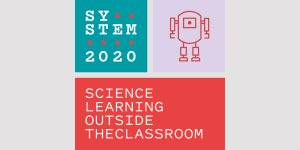
SYSTEM2020 Learner's Perspectives
Discover how learners involvement with out of school science education has allowed them to expand their knowledge and adapt with the changing world around them.
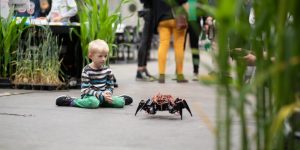
OSHub.Network
Ars Electronica (AT), Science Gallery at Trinity College Dublin (IE), Impact Hub Siracusa (IT), La Casemate (FR), Onl'Fait (CH), SCIENCE IN (CZ), Município de Figueira de Castelo Rodrigo (PO), SciCo (GR)
The pace of change in society - from technological innovation to global interconnectedness - is rapidly increasing and has fundamentally altered the way people live, work and learn. Moreover, the societal challenges of the 21st century bring with them an urgent need to integrate the knowledge and expertise of different societal actors, and to develop meaningful and inclusive ways of connecting schools, universities, enterprises, civil society, governments and local communities using more innovative, efficient and open methodologies.

SYSTEM2020 Map
Science learning initiatives outside the classroom are crucial in educating and forming Europe’s next generation of researchers and innovators. By gaining insights into these initiatives all around Europe SySTEM 2020 wants to gain a better understanding of the types and kinds of programmes in operation, learn from each other and collaborate to be able to respond to challenges ahead. The SySTEM 2020 map is an online visualisation tool where over 2000 STEAM initiatives or projects are mapped providing a network of organisations for you to connect with. For the general public it offers a way to find informal learning initiatives in their area. For organisations it offers the opportunity to get connected and gain visibility as a collective community within Europe.
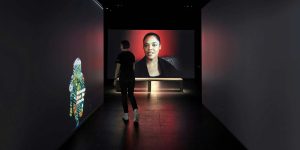
CyberArts 2020 - Prix Ars Electronica Exhibition
Seit 1998 präsentiert das OK im OÖ Kulturquartier die CyberArts. Als Ausstellung der preisgekrönten Werke des Prix Ars Electronica ist sie eine ausgezeichnete Plattform zur Beobachtung aktueller Entwicklungen und Trends im digitalen Zeitalter, wobei hier deren soziale und ökonomische Auswirkungen in den Fokus gerückt werden. Die ausgewählten Arbeiten verdeutlichen, welche gesellschaftlichen Dynamiken und Themen aktuell bestimmend sind.
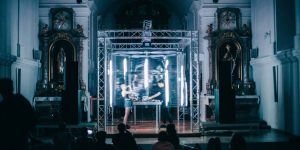
Guest Projects

Ars Electronica AIxMusic Online Hackathon: Final Presentations
Annelies Termeer (NL) moderator + Participants
Anlässlich des ersten Online-Festivals veranstaltet Ars Electronica seinen ersten internationalen AIxMusic Hackathon im Rahmen des AIxMusic Festivals 2020.
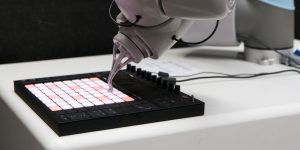
AIxMusic - Artificial Stupidity
Moisés Horta-Valenzuela (MX/US), Artemi-Maria Gioti (GR), Ali Nikrang (AT), Alex Braga (IT) and Portrait XO (US)
Das Panel "Artificial Stupididity" lädt KünstlerInnen des Ars Electronica Festivals ein, ihre Erfahrungen im Kontext von AIxMusic auszutauschen. Das Thema KI bekommt aktuell große Aufmerksamkeit in den Medien und wird kontrovers behandelt.
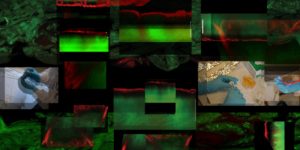
Demystifying Arts and Sciences through Playful Creative Technologies
Jo Berry (UK)
Jo Berry has implemented playful, creative methodologies to seek art's value, purpose and interpretational impact when it takes as its start point advanced imaging and microscopy. Her claim is that art can be a significant contributing factor to new directives in advanced imaging and microscopy; its impact intensified through applying play as a method to interrogate ideas, processes and outcomes. She offers a new model of research, which engages play as the critical driver to accomplish a more agile, accessible and open method of examining science via a different set of criteria. This hypothesis is based on my own prior experience as a researcher working directly with scientists and experiencing scientific method where I became convinced that artists should be central to scientific inquiry not just working on the periphery. As it would seem there needs to be a paradigm shift within science which, she claims, can be activated through examining play through art and identifying its effect on aspects of culture, creativity and aesthetics.
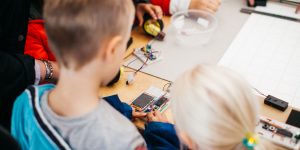
STEAM alignment across different educational levels at the University of Amsterdam
University of Amsterdam (NL)
This approach to STEAM education covers two programmes taught at the University of Amsterdam (UvA): the BSc Information Studies (three years) and the MSc Information Studies (one year) which are both located in the Computing Department. The approach provides students on both levels with room for exploration of the field based on shared activities mainly through project work. The aim is to provide students with technological, human and societal insights (theories, models, system implementations) so that they can comprehend and place themselves in the field of information science. The programmes are aimed at students from a mixture of subject backgrounds but joined in the desire to solve complex societal problems, using ICT and digital media.
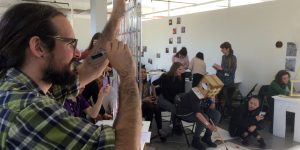
A Hybrid STEAM approach from the MA Art and Science at Central Saint Martins
University of the Arts London: Central Saint Martins (UK)
The MA Arts and Science (MAAS) is a two-year Master's programme, founded in 2011, recruiting students from different disciplinary backgrounds across the arts, sciences and humanities. The course builds a STEAM community utilising a shared studio space as a resource and setting for collaboration and cooperation. The philosophy of the course brings together different knowledges and aims to create a non-hierarchical platform for students, disciplines and methods.
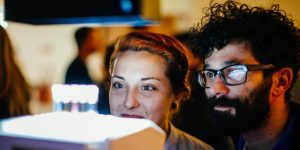
STEAM Approaches at Science Gallery at Trinity College Dublin
Science Gallery at Trinity College Dublin (IE)
Science Gallery Dublin was founded at Trinity College Dublin, the University of Dublin in 2008, with a mission to ignite creativity and discovery where science and art collide.
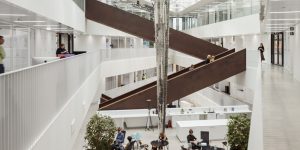
Arts for All: Aalto University-Wide Art Studies
Aalto University (FI)
The University-Wide Art Studies (UWAS) programme at Aalto University offers all students, irrespective of discipline, the chance to explore and study art and design-based practices and processes. This is a vehicle for the wider ambition of the institution to encourage the formation of transdisciplinary communities of teachers, students and researchers, with a view to tackling global challenges in imaginative and meaningful ways. There is an understanding that art and design should be considered to have a deeper purpose than the simply aesthetic: creativity can help society to be renewed.
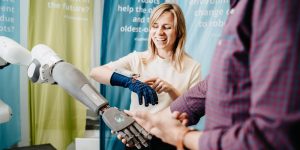
STEAM Approaches at Technische Universität Dresden
Technische Universität Dresden (DE)
The Technische Universität Dresden presents a number of approaches that employ concepts closely connected to STEAM and are transferred into/developed for teaching.
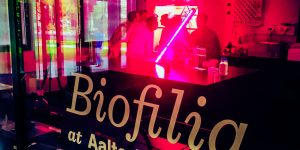
Aalto Biofilia: A journey into the biological arts
Aalto University (FI)
Biofilia is a technical facility at Aalto University for studies in the biological arts as a fast-emerging area of interest that fits succinctly with STEAM approaches in artistic practice. It adopts transdisciplinary knowledge sharing to research and curriculum development to explore the intersection between biosciences, engineering and the arts.
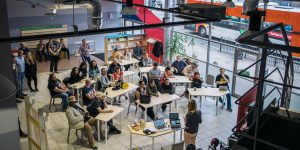
STEAM Fellows in Conversation
Steve Harding (UK)
Meet Dr Steve Harding, coordinator of BCU’s STEAM Fellows Programme, as he talks with Mark Brill (Art, Design, Media), Kusminder Chahal (Business, Law, Social Sciences) and Tychonas Michailidis (Computing, Engineering, Built Environment) about their transdisciplinary projects and how they will help to stimulate engagement across the University.
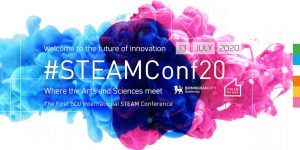
Oh My, What Now?
David Gillette (US)
Dr David Gillette from California Polytechnic State University San Luis Obispo delivers the keynote presentation for First BCU International STEAM Conference on future-focused storytelling, interactive design and sustainable futures. Dr Gillette is founder and Co-Director of the Liberal Arts and Engineering Programme at Cal Poly.


